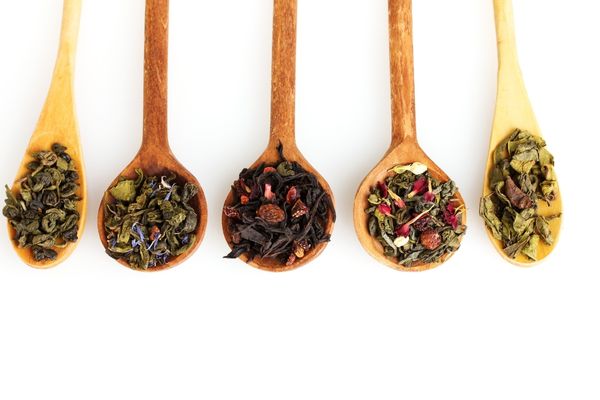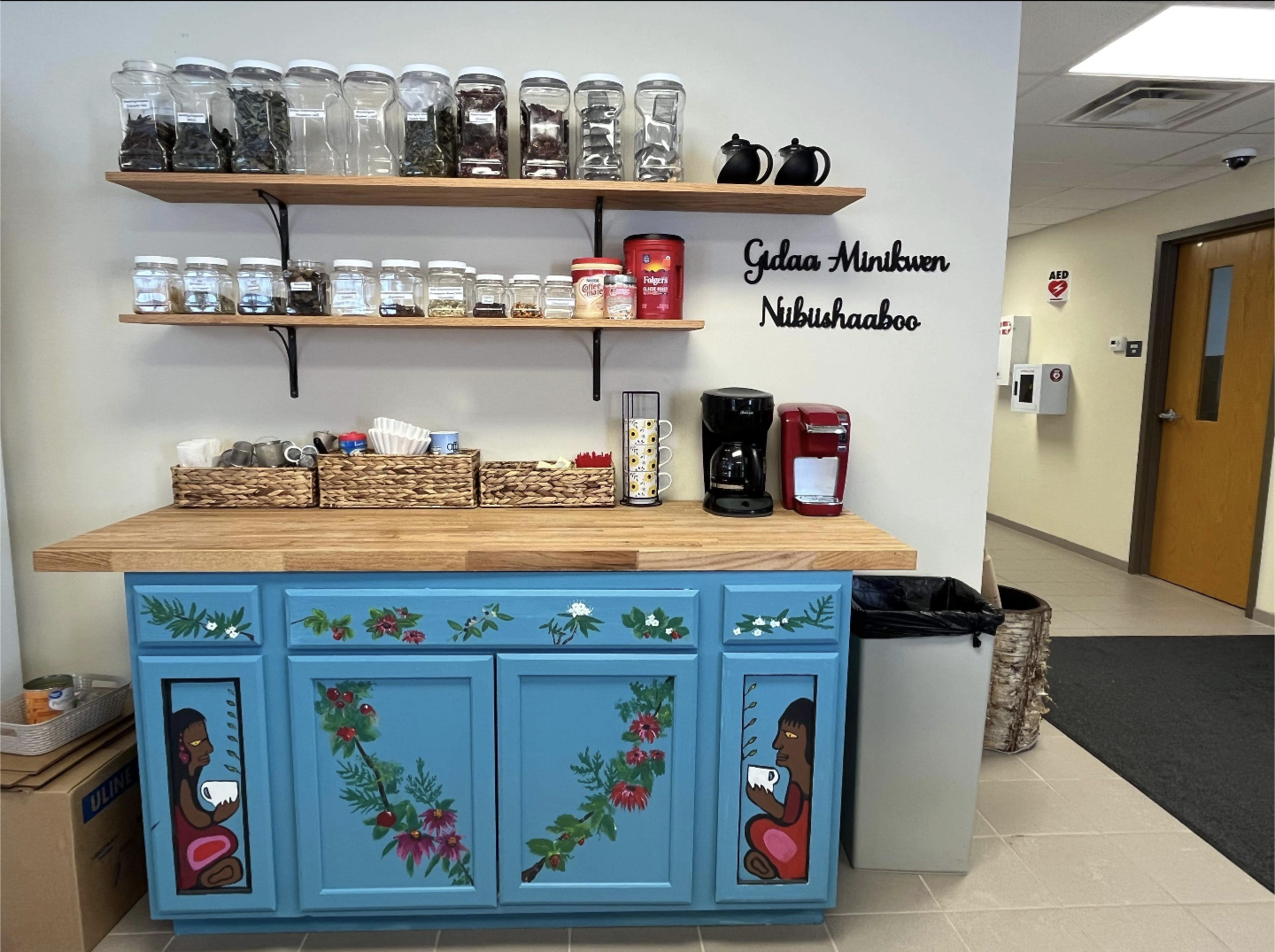
- Details
- By Stacy Thacker
SAULT STE MARIE, Mich.— A bright blue tea station stands out against the modern office setting, bringing light with its painted-on traditional plants to an otherwise dull space. But the tea station brings more than color to the room — it creates a community with its two shelves of traditional teas and sunflower-printed drinking mugs.
The tea station is a new addition at Waishkey Bay Farm located in Brimley, Michigan. The farm is an extension of Bay Mills Community College — an accredited tribal college — and offers many cultural teachings and learning experiences including rabbit snaring and a community garden.
“It’s a great conversation piece, and it adds a different element to the farm,” Connie Watson said. “It gives people the opportunity to try them because one of the barriers of people trying traditional tea is they don’t have the ingredients.”
Watson, a member of the Sault Tribe of Chippewa Indians, is the Program Director of the Good Health and Wellness in Indian Country Program with Bay Mills Community Health. She said the tea station is a good conversation piece and a place for the community to come together and share stories and memories.
The Bay Mills Indian Community, located in the Eastern Upper Peninsula of Michigan is home to the Ojibwa and Chippewa tribes. With a population of over 1,300 people, the community is nestled along Lake Superior and about four miles from the Point Iroquois Lighthouse.
“I think anything that you can connect your culture and your tradition with, it’s just beneficial to your well-being and to your mental health,” Watson said. “Ultimately we’d like to see people drink more traditional teas, water and things like that versus coffee with caffeine or high sugar content drinks.”
 Traditional tea stand at Waishkey Bay Farm, an extension of Bay Mills Community College. (courtesy photo)
Traditional tea stand at Waishkey Bay Farm, an extension of Bay Mills Community College. (courtesy photo)
Before the pandemic, Watson said there were plans for tea foraging and other group activities, but as restrictions fell into place, those plans were put on hold. Since then, things have started to slowly reopen and the farm is able to start its community activities again.
“We’re always looking for opportunities to get people out in the woods for plant identification, things that are edible, things that you can use for tea or things that you can eat,” Watson said.
“We like to have family-based activities, all generations from our elders to our youth and even toddlers. We like to gather, and we like to have everyone included.”
Sharing and practicing cultural knowledge with the community is what Bay Mills Community College strives to do at all levels.
“It’s important for culture to be integrated and it’s not just something for special events,”
Kat Jacques, Farm Manager at Waishkey Bay Farm, said. “At the heart of a tribal college is the culture.”
Jacques said the farm hosts a range of learning events from beekeeping, food preservation, and seed saving to teacher training in food education.
“It’s not just farm staff or people from Bay Mills Community College who lead those, we try as much as possible to have the Bay Mills community members help lead,” she said. “We have so much knowledge in the community.”
Not only was the tea station mural painted by a local artist but the tea gathering and tea labeling was done with the help of community members.
“We had some folks in the community who helped translate so we could have language included on jars and canisters,” Jacques said, adding that the teas are labeled in Ojibwa as well as English.
Some of the traditional tea plants are grown on the farm while others have been foraged by student workers during the summer. Available teas include corn silk, mint, cedar, lemon balm, sweet fern, rose hip, wild chamomile, wintergreen and echinacea, to name a few. Jacques hopes to add blueberry leaf and bee balm in the future.
“Not everyone has had the chance to try so many of the delicious teas that grow right in our backyard that are healthy drinks,” she said.
The farm holds a monthly gathering called Wiisinidaa Mnomiijim or Let’s Eat Good Food. This month they are hosting a Tea Circle and are excited to share the traditional tea they’ve grown and harvested with the community. They will also have three guest speakers and welcome everyone out to the farm on February 13, 2023 from 5:00 pm to 7:00 pm at 10135 W Mills Road.
“If everyone is empowered to find their place in taking care and making sure that we can feed one another, and take care of everything that is out there that feeds us, that we’re just better for it,” Jacques said. “Healthy now and into the future.”
Help us defend tribal sovereignty.
At Native News Online, our mission is rooted in telling the stories that strengthen sovereignty and uplift Indigenous voices — not just at year’s end, but every single day.
Because of your generosity last year, we were able to keep our reporters on the ground in tribal communities, at national gatherings and in the halls of Congress — covering the issues that matter most to Indian Country: sovereignty, culture, education, health and economic opportunity.
That support sustained us through a tough year in 2025. Now, as we look to the year ahead, we need your help right now to ensure warrior journalism remains strong — reporting that defends tribal sovereignty, amplifies Native truth, and holds power accountable.
 The stakes couldn't be higher. Your support keeps Native voices heard, Native stories told and Native sovereignty defended.
The stakes couldn't be higher. Your support keeps Native voices heard, Native stories told and Native sovereignty defended.
Stand with Warrior Journalism today.
Levi Rickert (Potawatomi), Editor & Publisher

